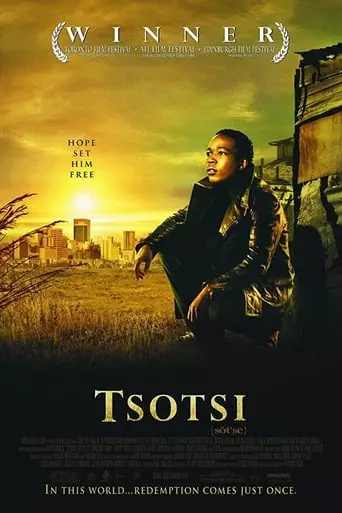
Tsotsi (2005) Watch Online Free
The South African multi-award winning film about a young South African boy from the ghetto named Tsotsi, meaning Gangster. Tsotsi, who left home as a child to get away from helpless parents, finds a baby in the back seat of a car that he has just stolen. He decides that it his responsibility to take care of the baby and in the process learns that maybe the gangster life isn’t the best way.
Tsotsi is a 2005 South African film directed by Gavin Hood, offering a poignant exploration of redemption and humanity within the harsh realities of Johannesburg’s townships. The narrative centers on David, a young man who, after witnessing his mother’s death and enduring an abusive father, becomes Tsotsi—a ruthless gang leader. His life takes an unexpected turn when he inadvertently kidnaps a three-month-old baby during a carjacking. This event forces Tsotsi to confront his past and grapple with his capacity for change.
The film’s storytelling is deeply rooted in the socio-economic challenges of post-apartheid South Africa, highlighting the stark contrasts between wealth and poverty. Through Tsotsi’s journey, the narrative delves into themes of identity, morality, and the possibility of transformation. The character’s evolution is portrayed with subtlety, emphasizing the profound impact of human connection and empathy.
At its core, Tsotsi is a narrative about personal redemption. The protagonist’s unexpected responsibility for the infant challenges his hardened exterior, prompting a reevaluation of his life choices and the possibility of change. This theme underscores the human capacity for growth and the profound effects of compassion.
The film poignantly illustrates how Tsotsi’s environment shapes his identity. Growing up in a violent and impoverished setting, he adopts a persona that aligns with his surroundings. This theme explores the influence of socio-economic conditions on individual behavior and the struggle to break free from one’s circumstances.
Tsotsi highlights the transformative power of human relationships. Interactions with characters like Miriam and the infant reveal the protagonist’s capacity for empathy and love, challenging his previously held beliefs about himself and others. This theme emphasizes the importance of connection in overcoming adversity.
The film delves into the complexities of morality, presenting characters who navigate a spectrum of ethical decisions. Tsotsi’s actions, though criminal, are portrayed with nuance, prompting viewers to consider the factors influencing moral choices and the potential for redemption.
Upon its release, Tsotsi received critical acclaim for its compelling storytelling and powerful performances. The film won the Academy Award for Best Foreign Language Film in 2006, bringing international attention to South African cinema. Critics praised its authentic portrayal of life in Johannesburg’s townships and its nuanced exploration of complex social issues. Roger Ebert described it as a film of deep emotional power, highlighting its ability to transform a young killer through the helplessness of a baby.
The film’s success has been attributed to its realistic depiction of urban life and its focus on character development over action-driven plots. It has sparked discussions about the socio-economic challenges in South Africa and the universal themes of redemption and humanity. Tsotsi has also inspired other filmmakers to explore similar narratives, contributing to a broader understanding of African cinema on the global stage.
After watching Tsotsi, you may experience a profound sense of empathy and introspection. The film’s raw portrayal of human struggles and the capacity for change is likely to evoke a range of emotions, from sadness to hope. The character’s journey from violence to compassion may inspire you to reflect on the complexities of human nature and the impact of one’s environment on personal choices. The film’s open-ended conclusion may leave you contemplating the possibilities of redemption and the power of human connection.
Overall, Tsotsi offers a compelling and emotionally resonant experience that challenges perceptions and encourages a deeper understanding of the human condition.
